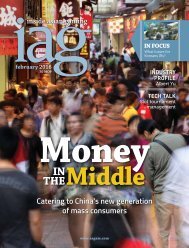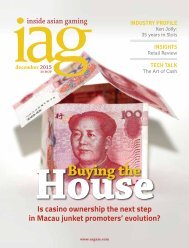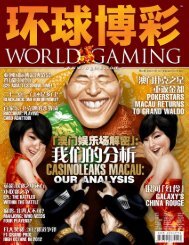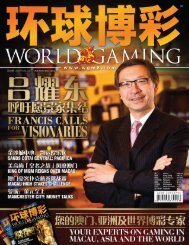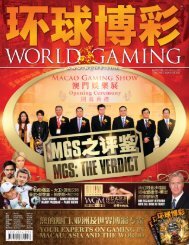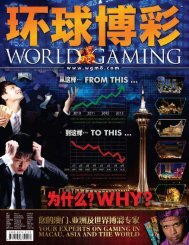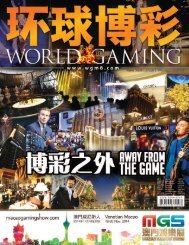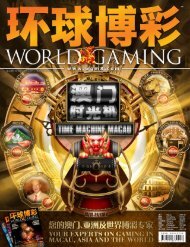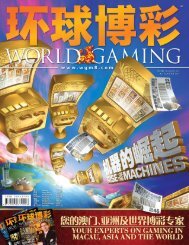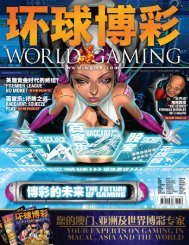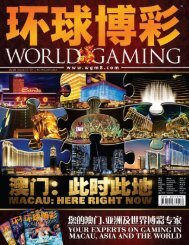WGM#38 NOV/DEC 2015
The Macau gaming industry is synonymous with junkets. First started by none other than Stanley Ho in the 1960s, these junkets and the VIP gamblers they provide have played a vital role in Macau’s rise over the past decade. However, the recent downturn has changed the landscape in this unique part of the world with the junket business suffering more than any other and a number of VIP rooms being forced to close in Macau over the past 12 months. So what does the future hold? In this issue of WGM, we speak exclusively to the Chairman of one of Macau’s biggest junket operators Tak Chun Group, Mr Levo Chan, about the current gaming climate, his expectations for the coming years and why Tak Chun has expanded while other junkets have slowed right down. Poker fans will enjoy our lengthy and intriguing interview with World Series of Poker (WSOP) Tournament Director Jack Effel who explains just how much goes into organizing the world’s biggest tournament series each and every year as well as regaling us with some of his favorite stories from the past. We tackle the smoking debate as Macau’s legislators decide whether to allow smoking in specially designated smoking lounges or ban the habit altogether, while our responsible gambling series sees us visit one of Macau’s main problem gambling treatment centres. In sport, we look at Manchester United’s big gamble on teen star Anthony Martial as well as examining which of the world’s major sports would benefit most from cracking the lucrative Chinese market. And our resident party animal tells us all about one of Macau’s newest trendy nightspots – Ritz-Carlton Bar & Lounge.
The Macau gaming industry is synonymous with junkets. First started by none other than Stanley Ho in the 1960s, these junkets and the VIP gamblers they provide have played a vital role in Macau’s rise over the past decade.
However, the recent downturn has changed the landscape in this unique part of the world with the junket business suffering more than any other and a number of VIP rooms being forced to close in Macau over the past 12 months. So what does the future hold? In this issue of WGM, we speak exclusively to the Chairman of one of Macau’s biggest junket operators Tak Chun Group, Mr Levo Chan, about the current gaming climate, his expectations for the coming years and why Tak Chun has expanded while other junkets have slowed right down.
Poker fans will enjoy our lengthy and intriguing interview with World Series of Poker (WSOP) Tournament Director Jack Effel who explains just how much goes into organizing the world’s biggest tournament series each and every year as well as regaling us with some of his favorite stories from the past.
We tackle the smoking debate as Macau’s legislators decide whether to allow smoking in specially designated smoking lounges or ban the habit altogether, while our responsible gambling series sees us visit one of Macau’s main problem gambling treatment centres.
In sport, we look at Manchester United’s big gamble on teen star Anthony Martial as well as examining which of the world’s major sports would benefit most from cracking the lucrative Chinese market.
And our resident party animal tells us all about one of Macau’s newest trendy nightspots – Ritz-Carlton Bar & Lounge.
You also want an ePaper? Increase the reach of your titles
YUMPU automatically turns print PDFs into web optimized ePapers that Google loves.
杰 克 的 扑 克 旅 程 The house that Jack built<br />
These days I’m the WSOP guy when it comes to<br />
all things poker operations offline. It’s been a great<br />
journey. In 2005 I came in as an assistant, the second<br />
year I came in as co-director and since 2007 I’ve been<br />
on my own in terms of the tournament director role.<br />
But since that time my role has also expanded to<br />
handle more things outside Las Vegas whether it be<br />
the circuit events, international expansion, setting<br />
up poker rooms, selling sponsorship or whatever it<br />
might be. It’s been fantastic.<br />
BB: Looking back to the poker boom you<br />
mentioned, it obviously all started in 2003 when<br />
Chris Moneymaker won the WSOP Main Event<br />
and then Joe Hachem’s win in 2005 had a similar<br />
impact in Australia which saw the game gradually<br />
spread across Asia. Your timing couldn’t have been<br />
any better!<br />
JE: It was an interesting time, right? I came along<br />
at a time when a lot of the guys in poker were<br />
the old time poker guys and although they were<br />
knowledgeable and great in their own right, it was<br />
just a different time. Everything was much smaller.<br />
It was a smaller community, the hospitality side of<br />
things was different – everyone could get a buffet.<br />
This was coming off of Binion’s closing and the<br />
WSOP moving to the Rio. The ownership of the<br />
WSOP moved to Harrah’s so there was the whole<br />
corporate side of things for running poker.<br />
At the same time online poker and poker<br />
on television were coming through so they were<br />
looking for people that could speak the language<br />
but also understood the business. I had the benefit<br />
of knowing how to deal with the poker players but<br />
I also went to business school. Being able to work<br />
with the players, understand the operations, the<br />
maths behind all of the events, the structure and<br />
payouts, the logistics of moving all the bodies in<br />
and out, the registration program – I’ve been an<br />
integral part of the development of all of those<br />
processes over the years.<br />
A lot of the stuff we do here when you look<br />
back to those early days, I created a lot of it. I made<br />
all the early errors when we were running those<br />
first big tournaments but I also came up with the<br />
solutions on how to run them better. There were a<br />
lot of things people didn’t know because no one<br />
ran multi-thousand people fields. Now we can run<br />
a 22,000 player field [the new Colossus event at this<br />
year’s WSOP attracted a record live field of 22,374<br />
players – Ed] like it was a 200 player field because<br />
the processes work. The things that change are the<br />
dynamics that surround the tournament such as<br />
the processing of the payouts and decreasing wait<br />
times. Now that we’ve figured out how to run these<br />
tournaments, our main thing is how to make the<br />
experience better.<br />
Every year we take feedback, we talk to<br />
players, we brainstorm and we think of new events<br />
that can enhance the schedule. Some things we<br />
get right and some things we don’t. This year I<br />
think we got a lot of things right and a couple of<br />
things wrong but the things we got wrong weren’t<br />
oversights, they were just things nobody thought<br />
of. That’s where you learn and you grow. The<br />
challenge is trying to oversee the improvements<br />
we make through everyone that’s working for you.<br />
I have 1,400 or 1,500 employees between all the<br />
different areas and they all roll up to me one way<br />
or the other. Some things you can’t predict like<br />
computers going down on the night of Colossus<br />
for four hours when you’ve got 700 people waiting<br />
to get paid out of the 2,200 you were paying.<br />
Or deciding to hold such a big event and have<br />
everyone pre-register – we didn’t know we were<br />
going to get 12,000 pre-registrations! Things like<br />
that come up and you go, “Wow.”<br />
BB: The WSOP has made a habit of introducing new<br />
and innovative tournaments like the Colossus each<br />
year. How do you come up with these new concepts?<br />
JE: A few years ago we decided we’d create an<br />
event, theme it like an anchor and build something<br />
around it. When we first started tinkering with<br />
anchors they were just basic No Limit Hold’em<br />
events held each weekend throughout the WSOP<br />
and we figured those would draw the masses.<br />
People would come out for the weekend, some<br />
would play two weekends and that was about it,<br />
but then we realized there were so many similar<br />
events available all over the place that people<br />
would just pick and choose when they would<br />
come. They’d think, “Well, if there is always a No<br />
Limit Hold’em event every weekend I’ll just pick<br />
the weekend that suits me best and play that one.”<br />
So we then started thinking about how to<br />
differentiate events to make people want to play<br />
more weekends – to give the players a bit more<br />
variety. That’s when we started coming up with<br />
things like the Millionaire Maker and the Monster<br />
Stack and now the Colossus. One thing we’ve<br />
determined through feedback is that players want<br />
the events to have a meaning or a definition – to<br />
be defined as something. So the Millionaire Maker<br />
had a guaranteed US$1 million for first place, the<br />
Colossus had the biggest live tournament field<br />
ever, the Monster Stack had a 10-times starting<br />
stack which is unheard of.<br />
The other thing unique about the WSOP is<br />
that it’s the only place where you can really play all<br />
the disciplines of poker because they’re not played<br />
anywhere else. Some disciplines aren’t played a<br />
great deal as a percentage but this is the place you<br />
can come to play them because we keep them<br />
alive. This is poker paradise and we want to keep<br />
it that way. You can come here and play whatever<br />
you want but also have a shot at really making it<br />
big. You can win a bracelet, win a lot of money,<br />
get on television and become a household name.<br />
Your dreams can come true here at the WSOP and<br />
I’m not sure anyone else offers anything remotely<br />
close to that. You might go and win US$1 million<br />
in another poker tournament but is it the same as<br />
winning a WSOP bracelet and what comes with it?<br />
I don’t think it’s even close.<br />
BB: Obviously when running an event of this size,<br />
problems will arise from time to time and there<br />
was a fairly sizeable one this year in regards to the<br />
new Modiano cards being used for the first time. A<br />
number of players complained that the cards were<br />
too thin and were easily marked. What went wrong?<br />
JE: Well, Modiano has been a card manufacturer<br />
for over 100 years. They’ve been around since<br />
1868 and have been used all over Italy. They are<br />
highly respected on every single level. We looked<br />
at them because we had a connection through<br />
our personnel and they were very gracious and<br />
55



